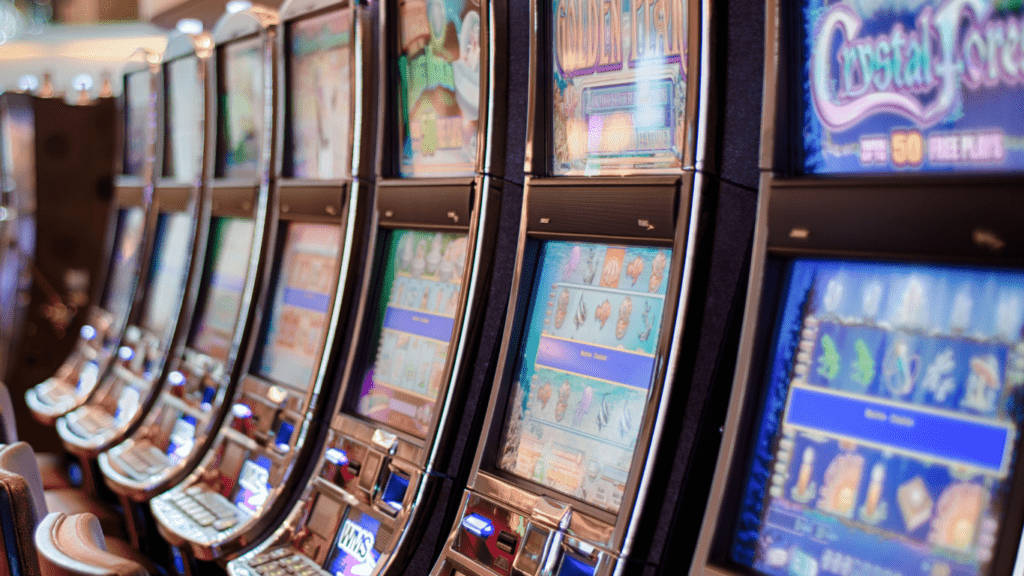Understanding the Concept of ‘Loosening’ Slot Machines
Slot machines have a reputation for being either “tight” or “loose.” Let’s dive into what “loosening” really means and separate common myths from reality.
What Does ‘Loosening’ Really Mean?
“Loosening” slot machines refers to the belief that casinos adjust machines to pay out more frequently. This concept suggests that during peak times, casinos tweak the payout rates to attract more players.
The term “loosening” implies making it easier for players to win, thus leading to more frequent payouts.
However, it’s crucial to understand how slot machines operate to grasp the validity of this belief.
Common Myths vs. Reality
Myth 1: Casinos Can Change Payout Rates On a Whim
The idea that casinos can immediately adjust slot machines’ payout rates is widespread. In reality, modern slot machines use random number generators (RNGs) governed by strict regulations.
Any change to a machine’s settings, including:
- its payout rate
- requires compliance with local gaming authorities and
- may involve a significant reboot process
Myth 2: Weekend Slots Are Looser
Many believe slots are looser on weekends due to increased foot traffic. The RNG ensures that every spin is independent of the previous one, maintaining consistent odds regardless of the day or time.
Casinos cannot legally alter payout percentages for specific days.
Myth 3: Hot and Cold Machines Exist
Gamblers often think some machines are “hot” (paying out frequently) while others are “cold” (rarely paying out). While machines may appear to follow such patterns, it’s pure randomness at play.
The RNG ensures each spin is entirely random, with no memory of past spins.
Myth 4: Machines Near Entrances Are Looser
A popular belief is that casinos place looser machines near entrances to draw in more players.
While placement may be strategic for visibility and traffic flow, no evidence supports that these machines have different payout rates compared to others.
Myth 5: Player Cards Influence Payouts
Some think using a player card affects a machine’s payout frequency.
Player cards track play for loyalty rewards but don’t influence game outcomes. The RNG operating within the machine remains unaffected by card usage.
Understanding these points clarifies that the concept of “loosening” slot machines is more a perception than a reality.
Ensuring fair gaming practices, regulatory bodies enforce stringent controls, making random payouts essential to the integrity of slot games.
How Slot Machines Work
Slot machines have intricate mechanisms that ensure fair and random outcomes.
Understanding these mechanisms can debunk many myths surrounding ‘loosening’ slot machines.
The Role of Random Number Generators
Random Number Generators (RNGs) determine the outcomes of slot machine spins.
These software programs generate thousands of numbers per second, even when the machine isn’t in use.
When a player hits the spin button, the RNG stops at a particular number, corresponding to a symbol or combination on the slot machine’s reels.
RNGs ensure fairness, as every spin is independent of previous spins, maintaining randomness and unpredictability.
Payback Percentage Explained
The payback percentage, or return to player (RTP), is another crucial aspect. This percentage represents how much the machine is programmed to return to players over its lifetime.
For example, a slot with a 95% RTP will return $95 for every $100 wagered, though this is averaged across millions of spins.
It’s not an indication of short-term outcomes but offers a mathematical edge that casinos rely on for long-term profitability.
Regulatory bodies audit these percentages to ensure compliance and fairness, further debunking the myth of ‘loosening’ slot machines.
Factors that Influence Slot Machine Odds

Casino-goers often speculate about various factors that might influence slot machine odds. Let’s dive into two main elements.
Casino Strategies and Player Beliefs
- Casinos utilize specific strategies to manage slot machine performance.
- They place high-visibility machines with favorable odds to attract players.
- Location and visibility play significant roles in a player’s perception of winning potential.
- Despite this, the notion that casinos can easily switch machine odds is a myth.
- Player beliefs often influence how they interact with machines.
- Many believe certain times of day or specific machines offer better odds.
- However, these beliefs have no basis in how RNGs operate. Each spin is independent of previous spins, ensuring randomness.
The Impact of Payout Schedules
Payout schedules significantly impact a player’s experience with slot machines. Return-to-Player (RTP) rates represent the percentage of total money wagered that a machine will pay back over time.
Machines with higher RTPs often appear more attractive to seasoned players.
Regulatory bodies audit these schedules to ensure compliance with fairness standards.
Casinos can’t alter payout schedules on a whim due to regulations. Understanding RTPs helps players make informed choices, but it doesn’t alter the inherent randomness of each spin.
Therefore, payout impact varies by machine but follows strict compliance rules.
Examining the Legality and Ethics of Slot Manipulation
Many people wonder about the legality and ethics behind “loosening” slot machines. To understand this, let’s explore the regulatory framework and ethical considerations.
Regulatory Framework and Compliance
Gaming authorities monitor and regulate slot machines to ensure fairness. In the US, the American Gaming Association (AGA) oversees these standards.
Regulators mandate that casinos use Random Number Generators (RNGs) in slot machines, ensuring outcomes remain random and unbiased.
Casinos must comply with state-specific laws. For instance, Nevada and New Jersey have stringent regulations. These laws cover Return to Player (RTP) percentages, communication protocols, and regular audits.
Compliance aims to protect players and maintain trust in the industry. Failure to adhere to these regulations results in penalties, including fines and license suspensions.
Ethical Considerations for Casinos and Players
Casinos and players face ethical dilemmas involving slot machine operations.
For casinos, ethical behavior means transparency and fair play.
Casinos should not mislead patrons about their chances of winning. Ethical casinos provide clear information on payback percentages and RTP rates.
Players bear responsibility as well. It’s essential to approach gaming with realistic expectations.
Understanding that slot outcomes are random helps prevent misconceptions. Resorting to strategies or myths undermines the integrity of gaming.
Strict regulations and ethical practices ensure that “loosening” slot machines remains a myth. By adhering to legal standards and ethical principles, casinos and players contribute to a fair gaming environment.

 Oliver Paget is a seasoned gambling advisor and prolific article writer, contributing his extensive knowledge and expertise to Gamble Guru Gate. With a background steeped in the gambling industry, Oliver has become a trusted voice for both novice and experienced gamblers seeking reliable information and strategic advice.
Oliver's journey into the gambling world began with a fascination for the statistical and psychological aspects of gaming. This curiosity led him to pursue advanced studies in statistics and psychology, equipping him with a deep understanding of game theory, risk management, and player behavior. His academic background, combined with hands-on experience in various gambling environments, allows Oliver to offer a well-rounded perspective on the industry.
Oliver Paget is a seasoned gambling advisor and prolific article writer, contributing his extensive knowledge and expertise to Gamble Guru Gate. With a background steeped in the gambling industry, Oliver has become a trusted voice for both novice and experienced gamblers seeking reliable information and strategic advice.
Oliver's journey into the gambling world began with a fascination for the statistical and psychological aspects of gaming. This curiosity led him to pursue advanced studies in statistics and psychology, equipping him with a deep understanding of game theory, risk management, and player behavior. His academic background, combined with hands-on experience in various gambling environments, allows Oliver to offer a well-rounded perspective on the industry.
